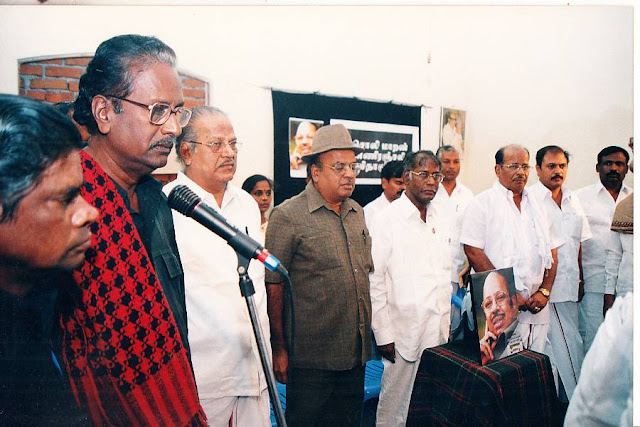Dravida Peravai is a
political party with a difference. It strives to unite global Tamils without
aspiring for power. Following the rationalist ideals of Periyar E.V.Ramasamy
and Aringnar Anna for a decade this party had been active from Pondicherry in
India. Its General Secretary N.Nandhivarman by his speeches, writings and press
statements spelt out the policies of the party. This website lists out the
articles which form the basis of the party's ideology
THE IDEALS OF NANDHIVARMAN
In NEW TIMES OBSERVER, the Premier English weekly from
Pondicherry
Editorials
1. Farmer's
Plight [16.09.1994]
2. Heed to
the Engel's Word of Caution [ 21.11.1994]
3. Indianomics
for Emancipation [12.12.1994]
4. English
is the Lingua Franca Nature offers [06.03.1995 ]
5. Workers
of the World Unite [01.05.1995]
6. The Impersonal
God of Evolution [ 25.05.1995]
7. Cultivate
Galaxy-al Thinking [05.06.1995]
8. Exploitation
is the Capitalist Creed [19.06.1995]
9. Panchayat
Raj will not succeed in post-Rajiv era [26.06.1995]
10.Religion is Power
Mongers Paradise [10.07.1995]
11.Law with Lacunae and
Loopholes [07.08.1995]
12.Statehood is for
people's good [21.08.1995]
13. Evolve
Concrete Programme -Avoid Election Year Gimmicks [04.08.1995]
14.Time for Gandhian
Renaissance [25.09.1995]
15.Simple living for
Global Justice [16.10.1995]
16. Economic
Sovereignty is in grave danger [ 30.10.1995]
17. Is Panchayat
Raj Beginning of India's October Revolution ? [06.11.1995]
18.Cooperative
Socialism [20.11.1995]
19.Finance Ministry's
faux pas [27.11.1995]
20.Pondicherry's Geo
fracture : A warning of Nature [ 16.12.1995]
Articles in New Times
Observer
1. Language
Adulteration [18.9.1972]
2. We stand
for Scientific Socialism [ 13.11.1972]
3. For a Fair Deal [
25.12.1972]
4. Capitalism will
give way to [ 26.07.1993]
5. Link All
Rivers [ 02.08.1993]
6. Let India guide
the World [ 11.10.1993]
7. Protest without
causing hardship to people [ 01.11.1993]
8. Towards
a better tomorrow [ 06.12.1993]
9. Preserve
Nature's Treasure Trove [ 10.1.1994]
10.Global Market
Culture [24.01.1994]
11.Few count millions
while millions suffer in silence [ 14.01.1994]
12.Law Makers versus
Law Breakers [25.04.1994]
13.Is it our fate
to be late ? [16.05.1994]
14.Umbrella against
American Imperialism [ 18.07.1994]
15. Reservation
is no answer to raising Unemployment [ 25.07.1994]
16. Vulture
Culture [ 08.08.1994]
17. Science A
prisoner of Super powers [ 15.08.1994]
18. Social
Justice or Partial Justice [ 29.08.1994]
19.Looting
Lobbies and helpless have-nots [ 05.09.1994]
20. Share
prosperity and care for tribes [03.10.1994]
21.Classless Casteless
Society [ 10.10.1994]
22. Beware of
Graft Craftsmen [ 17.10.1994]
23.Brain Drain [
07.11.1994]
24. Plague of
Corruption [ 14.11.1994]
25.Global village with
Nuclear garbage [ 28.11.1994]
26. Live in
Harmony with Nature [ 05.12.1994]
27.Economics without
Ethics [ 19.12.1994 ]
28. One God One
Creed [ 26.12.1994]
29. Let
Have-nots Have Smile-lit faces [02.01.1995]
30.Politics of
Pollution [23.01.1995]
31. The
irreversible Reform-raj [ 06.02.1995]
32.To redeem Humanity
from poverty [ 13.02.1995]
33.Build on Gandhian
Lines [27.02.1995]
34. Dialectics of
Technology [13.03.1995]
35.American
Spider's Web [ 13.03.1995]
36.Frozen and Flying
Foreign Exchange [20.03.1995]
37.A concept of God
acceptable to all: An Alternate Society for Global Peace [
03.04.1995]
38. New Times for
Global Peace [ 10.04.1995]
39. What is
Truth ?[ 17.04.1995]
40. Tamil script
Reform [24.04.1995]
41. Economic
programme to make all people happy [ 24.04.1995]
42. Evolve single
Global currency to integrate global economy [29.05.1995]
43. Rational
Research on Religions [19.06.1995]
44.Apostles of Change
Evolve Cosmic culture [03.06.1995]
45.Emerging
Enviro-Consciousness [ 10.07.1995]
46. Inner party
democracy absent in our days of Autocracy [28.08.1995]
47.Stop Boasts of Food
Exports: Feed empty stomachs first [ 23.10.1995]
48.Plans needed for
Pondicherry Water Resources Management [20.11.1995]
49 Under
Manmohanomics School Everyone is welcome to exploit [ 11.12.1995]
50.Economic barbarity [
25.12.1995]
51.Mr.Le Batonnier
Gnanou Diagou-a Profile [ 15.11.1996]
52 The Enviro
History of Pondicherry [ 24.01.2000]
53. Pondicherry
Port: A Boon to boost our economy[ 28.08.2000]
54. Is Indus
Valley the cradle or catacomb of Dravidian Civilization-I [20.10.2004]
55.Is Indus Valley the
cradle or catacomb of Dravidian Civilization-II [24.11.2004]
56.Is Indus Valley the
cradle or catacomb of Dravidian Civilization-III [ 12.01.2004]










